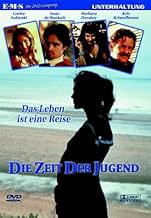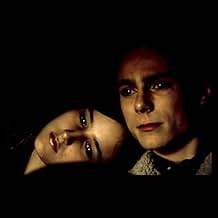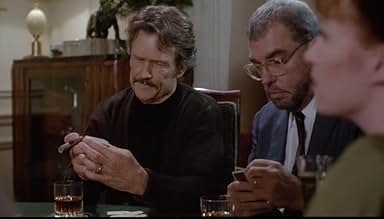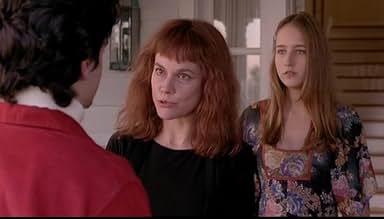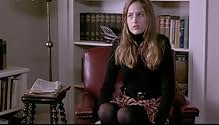La figlia di un soldato non piange mai
Aggiungi una trama nella tua linguaThis fictionalized story, based on the family life of writer James Jones, is an emotionless slice-of-life story. Jones here is portrayed as Bill Willis, a former war hero and now successful ... Leggi tuttoThis fictionalized story, based on the family life of writer James Jones, is an emotionless slice-of-life story. Jones here is portrayed as Bill Willis, a former war hero and now successful author who obviously drinks too much and is starting to experience health problems.This fictionalized story, based on the family life of writer James Jones, is an emotionless slice-of-life story. Jones here is portrayed as Bill Willis, a former war hero and now successful author who obviously drinks too much and is starting to experience health problems.
- Regia
- Sceneggiatura
- Star
- Premi
- 4 candidature totali
- Mamadou
- (as Isaac De Bankole)
- Madame Beauvier
- (as Macha Meril)
- Stephane
- (as Frederic Da)
Recensioni in evidenza
The film is divided into three separate sections: "Billy," which discusses the arrival of an adopted son into the family, "Francis," which revolves around the female protagonist, Channe's, best friend, and "Daddy."
In each of these categories, we are primarily subjected to the experiences of Channe, who is portrayed by the nubile, charismatic Leelee Sobieski. In them, we learn a little about her character, though strangely enough, not as much as we do about her father, whose unconditional positive regard for his daughter does much more than delineate the characteristics of the relationships among the members of the family.
The acting from the entire cast is superb, and from the actors' and actresses' demeanor emanates a very credible atmosphere. Yet the one element that truly grasped my attention was the editing, which with the exception of a couple of segments, added an extremely high element of poignancy to the story. James Ivory was obviously extremely assiduous with the film in this respect, and the final result consists of a strong narrative which appears somewhat terse, but knows exactly what quantity of what the viewer should be fed.
Cynical commentary has argued that this film is nothing short of tripe because it lacks a resolute motive--it consists of no conflict at all. All it is is disjointed scenes which serve no relevance to one another, and fail to tell a coherent story. The former statement in regards to the lack of conflict holds true, but the latter is what might be deemed questionable. Afterall, this is a story about the life of a family--and in a real family, few events from the past bear relevance to those of the present. "A Soldier's Daughter Never Cries" simply seeks to discuss the development of relationships in a family; events of high caliber are discussed thoroughly, while those of less importance portray to be all that they could ever be: memories.
What interested me in retrospect was WHY it's plotless, and what that says about the kind of portrait being drawn here.
The film is putatively about the protagonist, whom we see from childhood through adolescence. But in fact it is a carefully drawn study of that classic ideal, the Honest and Just Man. In this case, her father, based on the novelist James Jones (played by Kris Kristofferson, whose craggy face so suits the ideal in question that he hardly has to speak.)
Most of the incidents serve to demonstrate one of two points: that her father is deeply loving and understanding, and a bit unconventional (as is her mother), and that the family - which includes her adopted French brother - is close and loving despite being outsiders both in France and the US. We also see scattered images of her sexual awakening (which includes some early promiscuity), but even these in the end say more about her father than her.
The film's greatest strength is, in fact, this portrait of a family united in unconditional love, which endures even after the father's death. This image - certainly a profoundly tempting ideal to many of us - lingers after the film is over and is its most satisfying element. And in fact the film stayed with me well after I'd seen it, and I could recommend it to many viewers on that basis.
But why is a film with four characters, rich in emotion, devoid of a central plot?
Because it's devoid of a central conflict. The father is relentlessly understanding and loving; the daughter is relentlessly grateful. Meanwhile , it's clear, even in this idealized portrait, that both parents drink (a lot). The daughter's attachment to another outsider at one school and her sexual acting out at another are never really examined. Yet they suggest something far more difficult and conflicted than a happy childhood. Certainly, the known effects of growing up with alcoholic are barely acknowledged, much less highlighted.
Perhaps this was a conscious decision, an attempt to avoid an aspect that of course is overdone in much contemporary drama. But certainly it points to SOME drama at the heart of this family, some conflict that might have more productively been examined and used as a guiding thread. (Even the simple fact of adoring a 'perfect' father has its own inherent conflicts, as was beautifully shown in "Eve's Bayou.")
So what we end up with is an ideal, and certainly the hunger for ideals is real enough. But here I felt too that it was a missed opportunity, an attempt to portray perfection at the expense of achieving resolution.
Acting is exceptional in this film. The first segment shows the time right after the brother, Billy, being adopted when he was 7 years old. Channe was also 7 at that time and the child actress who played her (Luisa Conlon) really deserves our praise. In the next two segments Channe (14 and 17 yrs respectively) was brilliantly portrayed by Leelee Sobeiski who is much responsible for the rather reserved nature of the character. Kris Kristofferson does a solid job as the father. His character is an unique one, as evident not only by the words he spoke, but also by Kristofferson's accent and expressions. Among the other actors Jesse Bradford is worth mentioning as Billy is last two segments. The actor who played Francis in "Francis" brings too much dramatic persona in my opinion. Though arguably that's one of the best things about the character. And there's also a nice extended cameo by Virginie Lledoyen as Billy's biological mother.
Now about the characters and screenplay. Though stated from Channe's point of view, her father is the major influential character in this film. It was always his decisions, his outlook towards life that affected his family. The character of Channe is somehow very interesting. Her experiences with womanhood and men are written in an unique manner. And how she develops into a warm, soft-spoken yet determined personality is clearly something that Ivory spent time on. On the other hand Billy is a rather shy and quite unimpressive character with no apparent personal feature that should be rendered as a quality. Now Channe's school friend Francis has all the unusual features - he's an opera singer, loves to dance puppets, has a really corky sense of humor and his mother is an existentialist. His relationship with Channe is one of the film's major assets. All the characters are quite multi-layered, even Billy. The script is also masterfully written. A nice example is the conversation between Channe's father and her High School boyfriend Keith. I don't understand French that well so can't comment about the French dialogues though.
Actually, it is a film that is bound to be enjoyed if seen in a special mood. I'm lucky that I had that mood when it was showing on TV. Also it is a film that grows wonderfully with time, segment after segment. It's a really good coming-of-age story that should be considered as Ivory's one of the best works.
Lo sapevi?
- QuizFanny Crawford's debut.
- BlooperThe family is watching Una calibro 20 per lo specialista (1974) on TV, which was not even released to theatres until 1974, but we later see a date on a gravestone of 1973 (which means the TV scene was probably set in 1972, since there was an intervening New Year's Eve scene).
- Citazioni
Billy's Mother: I pray all the time, I pray he will be loved. As is his right.
- Curiosità sui creditiThe cast part of the credits is divided into three parts: First "Billy" (1-27), Then "Francis" (28-41), and finally "Daddy" (42-51)
- Colonne sonoreAmarra el porto en la dura
Written by Antonio Tejera
Published by Peer International Corporation (BMI)
Performed by Tito Puente
Courtesy of Tico Records and Sonido Inc.
I più visti
- How long is A Soldier's Daughter Never Cries?Powered by Alexa
Dettagli
- Data di uscita
- Paesi di origine
- Sito ufficiale
- Lingue
- Celebre anche come
- A Soldier's Daughter Never Cries
- Luoghi delle riprese
- Aziende produttrici
- Vedi altri crediti dell’azienda su IMDbPro
Botteghino
- Lordo Stati Uniti e Canada
- 1.782.005 USD
- Fine settimana di apertura Stati Uniti e Canada
- 39.517 USD
- 20 set 1998
- Lordo in tutto il mondo
- 1.782.005 USD
- Tempo di esecuzione2 ore 7 minuti
- Mix di suoni
- Proporzioni
- 1.85 : 1
Contribuisci a questa pagina



